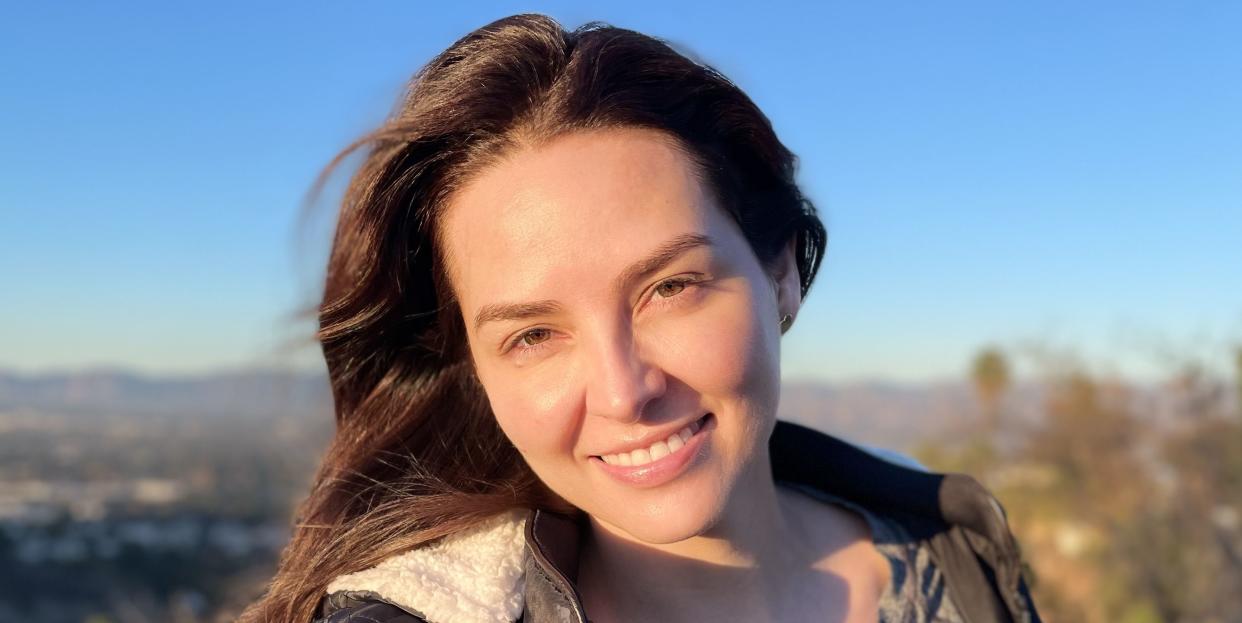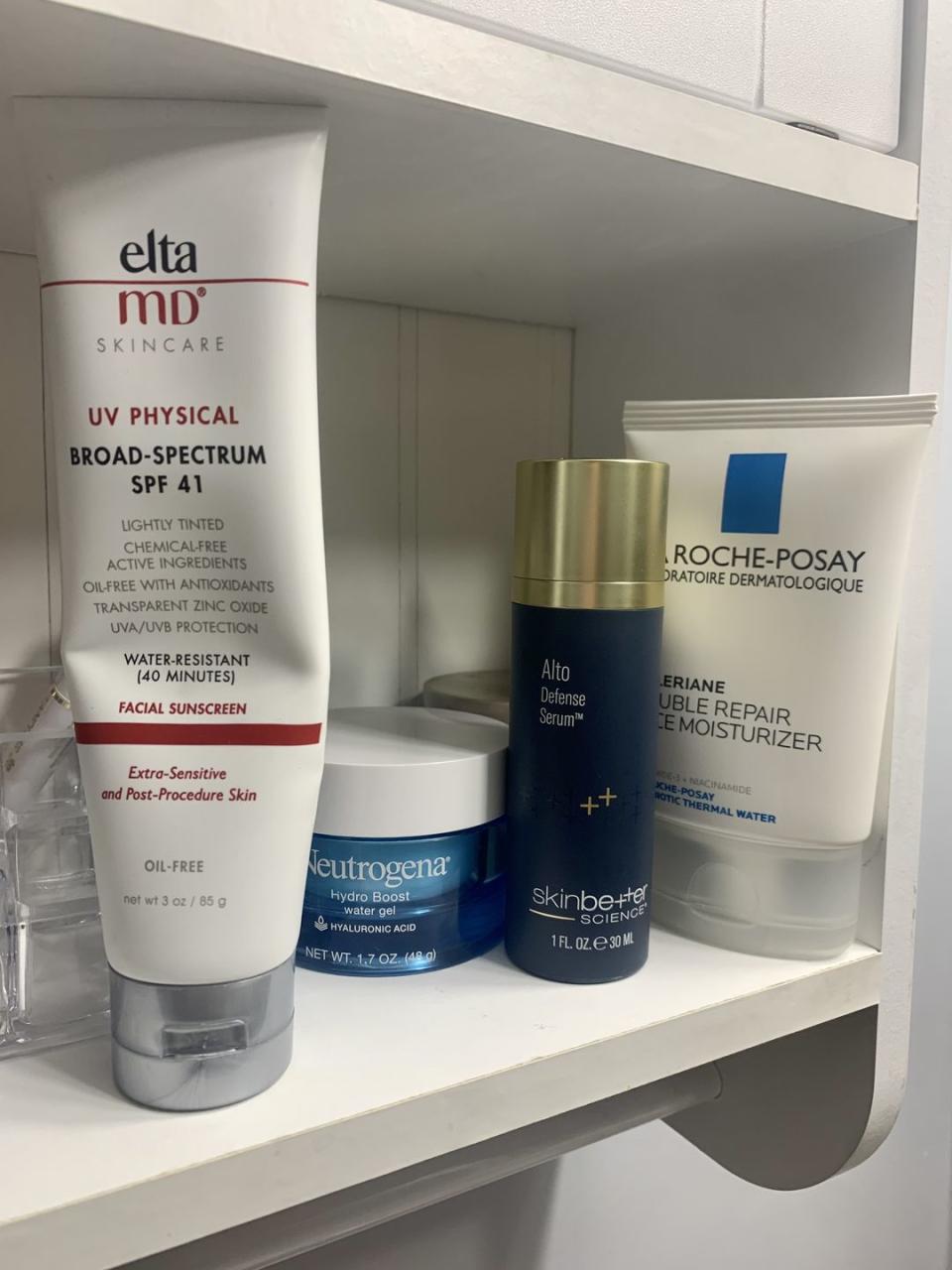Derm Diaries: ‘I’m a Dermatologist With Melasma And Acne—Here’s How I Treat It’

Dermatologists prescribe products to their patients all day long, but have you ever wondered which ones they personally use? Welcome to Derm Diaries, a series where dermatologists share their skin woes—and solutions—so you can steal secrets from their skincare routines.
For Lina Kennedy, M.D., a board-certified dermatologist in California, going into skincare wasn't her first career of choice, but one she coincidentally ended up loving. Sports were originally her main interest; she grew up in Southern California and competed in amateur boxing as a teen, becoming a Junior Olympic and Silver glove champion.
She did have dreams of being in medicine, but had no idea she would end up in dermatology. "When I first started medical school, I thought I would become a pediatrician. I soon realized that although I love children, I prefer spending time with them when they are healthy and happy," says Dr. Kennedy. So she pivoted to dermatology, after recalling the fond memories she had of her own dermatologist, who helped treat her acne-prone skin.
Dr. Kennedy spent her first and second year of medical school learning more about the specialty, participated in Camp Discovery, a camp for children with chronic skin conditions, and shadowed dermatologists through the American Academy of Dermatology’s Diversity Mentorship Program. "The more involved I got, the more I loved it. The ability to treat patients of all ages, treat a variety of skin conditions, and have a diverse set of skills from diagnosing to performing surgeries to mentoring students, and having a flexible schedule all sealed the deal for me," says Dr. Kennedy.
Today, Dr. Kennedy still battles acne, except that now it has transitioned from comedonal to hormonal acne. Throughout the years, she's used both topical and oral antibiotics—most recently, spironolactone, an oral medication. She currently keeps her acne in check with Aczone gel, a prescription topical antibiotic, and a nightly retinoid.
In addition to acne, Dr. Kennedy has also been battling melasma for the past 10 years, which she says can be trigged by things like sun exposure, pregnancy, birth control, and hot temperatures. Since even five minutes in the sun can cause the condition to flare up, she makes sure she's always well-protected. "I use a wide brimmed hat, sunglasses and never skip my sunscreen." Dr. Kennedy now keeps her melasma at bay using a skin brightener serum, strict sun protection, and a solid skincare routine that keeps her skin clear, firm, and bright. Here are the go-to products she depends on.

She uses a foaming face wash every morning and night.
"I wash with La Roche Posay Toleriane Purifying Foaming Face Wash, which works well for normal to combination skin. It also contains niacinamide, an antioxidant that can help brighten skin and control oil production. I love it because it cleans my skin well, even removing makeup, without drying me out."
She follows up her morning face wash with an antioxidant-packed face serum.
"The SkinBetter Science Alto Defense Serum is a powerful antioxidant serum that combines a gentle vitamin C (tetrahexyldecyl ascorbate), vitamin E, and 17 other antioxidants to help fight free radicals and prevent damage from our daily environmental exposures."
When she isn't using Hydroquinone, Dr. Kennedy likes using the SkinBetter Even Tone correcting serum, a skin brightener, to control her melasma.
"I love the Even Tone serum because it contains alpha arbutin and botanicals to help correct skin discoloration. It’s a great product to help control melasma during the hydroquinone free phases."
An overnight cream helps to hydrate her skin and fight aging.
"I absolutely love the Intensive AlphaRet retinoid because I am able to use it nightly without experiencing any peeling. The lactic acid is a great addition as it provides hydration to the skin. It contains retinoid, lactic acid, glycolic acid and packed with other antioxidants to reduce fine line and wrinkles, exfoliate, and fight free radicals."
She never skips her sunscreen.
"This lightly tinted mineral sunscreen from Elta MD protects against UVA, UVB and visible light. I really like the tint to help cover up some mild melasma, too."
She also makes sure she reapplies SPF when necessary.
"I love using Colorescience Sun Forgettable Total Protection Brush-On Shield SPF 50 for sunscreen reapplication which is essential for managing melasma."
Her exfoliation routine is two to three times a week, alternating between two go-to products.
"Both of these products contain glycolic acid as their main ingredient. Glycolic acid in the Sente Exfoliating Cleanser is a great alpha hydroxy acid that can help improve hyperpigmentation and brighten full skin by gently exfoliating the skin. The AlphaRet Exfoliating Peel Pads also contain salicylic acid, which can help against acne and lactic acid, a great exfoliator for those with sensitive skin as it also provides hydration to the skin."
Hydration is always top of mind.
"This Neutrogena Hydro Boost oil-free gel that works well to hydrate skin. It's perfect for oily or acne-prone skin."
That means switching up her moisturizer during the winter months.
"This lightweight, oil-free moisturizer made with La Roche-Posay prebiotic thermal water, ceramides, niacinamide, and glycerin helps soothe dry skin and restore the skin barrier."
You Might Also Like

